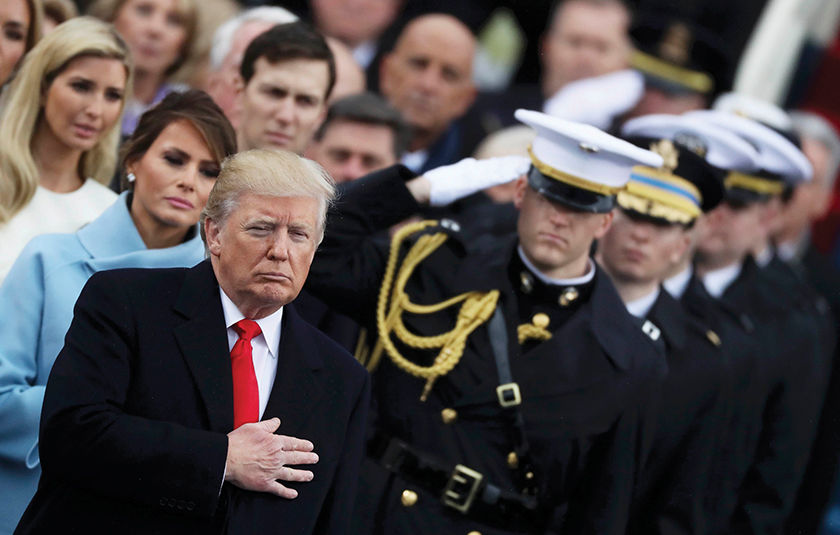As President Donald Trump took office Jan. 20, he entered that vaguely defined set of “major world leaders.” Though we could debate who else belongs, it would include the prime minister of the UK, the chancellor of Germany, the secretary-general of the UN, the president of Russia, and the president of China. Probably, the prime minister and president of Israel and Iran belong there, too, though it’s less of a slam dunk.
One other figure, however, is clearly a member of the club, though in a highly unique fashion: the pope.
A president’s success is, to some extent, dependent upon carving out good working relationships with those other titans of the earth. Trump would seem to face challenges with several, but perhaps no partnership promises to have more of an “odd couple” quality to it than Trump and Pope Francis.
Where Trump is brash and flamboyant, Francis extols humility and simplicity; where Trump is a business tycoon, Francis is legendarily averse to the corrupting influence of money; where Francis is a progressive-minded reformer, Trump ran as a strong conservative; and where Trump projects an “America first” attitude, Francis has a special passion for the peripheries.
In other words, this isn’t quite a match made in heaven.
It’s remarkably easy to project where the Trump administration and the Vatican under Pope Francis may clash, from immigration and climate change to crime and punishment and the use of military force. In fact, it often seems the more challenging thing is to identify possible areas of agreement, aside from a cluster of pro-life issues.
However, here’s one point where Trump and Francis may find common ground, if only in the sense of sharing the same headache: Russia.
As is well known, Trump came under fire on the campaign trail for his alleged coziness with Russian President Vladimir Putin, to the extent that many Americans believe Russia actively conspired to tip the election to Trump, and the FBI and five other intelligence and law enforcement agencies are reportedly examining that possibility.
Undeterred, Trump essentially doubled down on his pro-Russia line by nominating Exxon executive Rex Tillerson as his secretary of state, who takes pride in his “very close relationship” with Putin and his extensive business dealings with Russia.
As his term begins, Trump faces no greater risk of blowback from his base than over Russia, with important elements of both the Republican leadership and conservative opinion-makers calling for resistance.
A recent Economist/YouGov poll found only 37 percent of Republicans have a favorable view of Russia, which, admittedly, is a huge jump from 10 percent in July 2014, but still nowhere close to a majority.
In his own way, Francis has come under fire for the same thing.
Though Francis doesn’t have quite the “bromance” with Putin that Trump does, he’s earned considerable political capital in the Kremlin on a variety of fronts. For one thing, Putin credited Francis in late 2013 with helping to head off an anti-Assad Western offensive in Syria, and in general the Vatican shares Moscow’s diagnosis that trying to dislodge the Syrian leader would be a mistake.
On the Vatican’s side, that’s partly because most Christian leaders in the region are telling Rome that the alternative to Assad isn’t a vibrant democracy, but chaos that would put even more Christians at risk.
Francis also has pleased Moscow by not coming down harder over eastern Ukraine, at one stage even outraging his own Greek Catholic Church by describing the conflict as “fratricidal,” suggesting it’s largely internal, rather than the result of Russian aggression.
Francis since has reconciled with the Greek Catholics, and he’s taken up a special collection to support relief efforts in Ukraine, but in general he’s avoided rhetoric that would be taken as provocative.
In terms of why, ecumenism has a great deal to do with it. Francis is serious about the quest for Christian unity, beginning with the Orthodox, and he knows that the Russian Orthodox Church is the 800-pound gorilla in that world. He pulled off a first-ever encounter in February 2016 with the patriarch of Moscow at the Havana airport, and doesn’t want to do anything that would roll back the clock.
Given the tight relationship between church and state in Russia, above all that means not being perceived as hostile to Russia’s national interests.
Like Trump, Francis faces criticism from his base over his Russia policy. Many Catholics charge him and the Vatican with excessive “ecumenical correctness,” insisting that he should be more outspoken on Ukraine, and that he should challenge the Russian Orthodox to drop its hostility to the Greek Catholics and the Eastern churches generally.
Basically, those Catholics think the Russians always want ecumenical dialogue to be on their terms, and they’d like to see the pope remind them who the real 800-pound gorilla of Christianity actually is.
Of course, both Trump and Francis have a powerful argument to offer, that in a multilateral world, one in which Russia’s economic and military resources make it an important center of power, engagement beats isolation. In the Middle East, for instance, they may plausibly contend Russia is a necessary partner in the long-term struggle against Islamic extremism.
In any event, the point is that when it comes to Russia, Trump and Francis find themselves in more or less the same boat, albeit for very different reasons. Perhaps if they start to row together, they’ll find other shores to which they can steer as well.
This article originally appeared at the Catholic news site cruxnow.com

